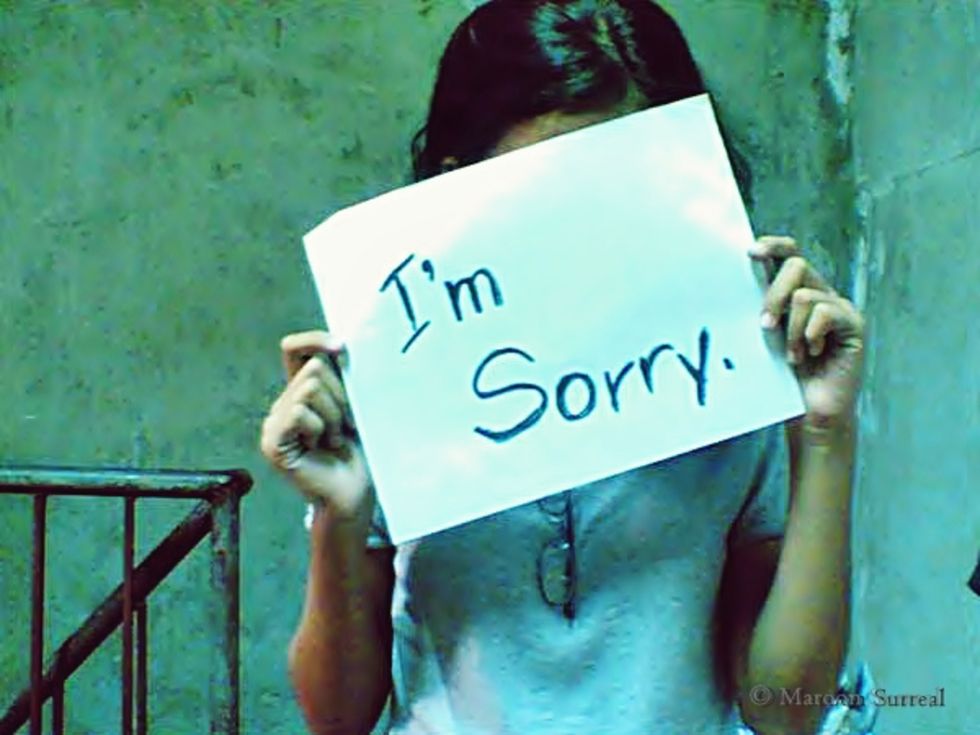"Stop apologizing."
People scold me countless times for excessively apologizing. I apologize when I ask someone for help, fearing that I may be an inconvenience. I apologize when I get too excited when I'm talking, fearing that I am irritating everybody with my enthusiasm. I apologize when I ask to hang out with somebody, fearing that she had other plans and I am simply interfering. In other words, I suffer from "sorry syndrome," where apologizing is essentially a reflex for me. Though this condition is not a medical condition, I know that for many of us, apologizing becomes a tic. We apologize and we don't realize it.
As a first-year college student, I am meeting many people for the first time and everyone has only known me for a couple of months, yet people already know that I suffer from "sorry syndrome." One time somebody pointed out that I apologize too much, and I wondered how on earth that person already noticed. I recounted everything I said and realized I had apologized numerous times in the last few minutes for trivial reasons.
If I say "sorry" too many times, my apologies will begin to depreciate in value. In other words, I will apologize so much that every time I say "sorry," nobody will believe that it is genuine remorse, even if it is. After I thought hard about how to break this habit and realized many of us are guilty of constant apologizing, I compiled a list of 7 alternatives for "I'm sorry" so we can own our words and stop retracting them.
1. Identify exactly what your flaw is.
If we acknowledge that we are only human and we aren't perfect, it has much more value than a simple apology. Instead of apologizing for asking for help, say, "I really have a lot of trouble in [insert subject here]" or "I struggle doing [insert task here] by myself."
2. Use humor.
In more trivial situations, it is better to be self-deprecating. For example, if you bump into somebody, you can say, "I seriously do that all the time" or "Did I really do that again?" It can be endearing when you are able to laugh at yourself.
3. Make suggestions for what you will do in the future.
You appear more remorseful if you say exactly how you will improve yourself rather than merely apologize for what you already did. Examples would include stating, "From now on I will think before I speak and realize exactly what I'm saying" or "I will pay much more attention when I am in such a large crowd of people."
4. Appear grateful.
In conversation, rather than apologizing for a long story or an enthusiastic response, thank the other person for hearing your piece and respecting you. If you don't want to appear demanding when asking for help, thank the person for taking the time to help you. When you sound appreciative rather than submissive and apologetic, you flatter the other person and seem less insecure about yourself.
5. Value the other person's advice.
When you apologize for something you do repeatedly, it would be much more effective to ask the other person, "How do I stop [insert action here]?" rather than attach a meaningless apology every time you do the action. You then, in turn, show you esteem the other person's guidance and that you are looking to improve your own habits.
6. Say why you want to apologize without apologizing.
Rather than saying, "Sorry I'm so [insert adjective here]," try expressing that you "never want to seem [insert adjective here]" or "never intend to be [insert adjective here]." If you pinpoint why you are tempted to apologize without actually saying "sorry," you both appear considerate of the other person and relay the remorse for your actions.
7. Just own your words and actions!
This is probably the hardest alternative (at least for me), but when you act sure of your words and actions, you exude more confidence. You might need to take some time to think before acting to make sure your action won't warrant an apology, but overall, it's often best to trust yourself. Many of us are over-analyzers and hang on every word we say, but we often don't need to overthink everything. We should have faith that we are awesome people who don't need to apologize for who we are.







































